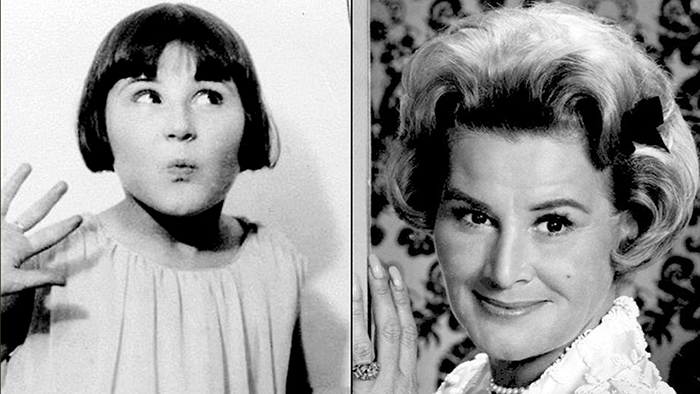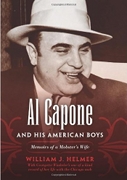Here are 10 things you should know about Rose Marie, born 100 years ago today. She worked in vaudeville, radio, records, movies, Broadway & TV. We’re featuring her music all day on Cladrite Radio so tune in!
Here’s an interview we did with her in 2017, one of the last she ever did.
Tag: Al Capone
Remembering Rose Marie: 90 Years a Trouper

Few entertainers in history enjoyed as long a career as did Rose Marie, born 100 years ago today. Her career began when she was just four years old (known then as Baby Rose Marie, she had a weekly radio program that was broadcast nationally before Shirley Temple was even born), and she went on to enjoy success in vaudeville, radio, records, motion pictures, Broadway, and television.
In 2017, a delightful documentary, Wait for Your Laugh, was released that told the story of her amazing life and career, and we’re delighted to share a very lightly edited transcript of a telephone conversation we had with her shortly after the film’s release. Buckle your seat belts; it’s a delightfully wild ride. As you’ll soon see, even at 94, Rose Marie was as sharp and as funny as ever.
Cladrite Radio: I have a lot of things I’d like to talk to you about.
Rose Marie: First of all, let me ask you a question.
Cladrite Radio: Sure.
Rose Marie: Did you see the movie [Wait for Your Laugh]?
Cladrite Radio: I did!
Rose Marie: What’d you think of it?
Cladrite Radio: I loved it. I thought it was great.
Rose Marie: What’d you like about it?
Cladrite Radio: I’m very interested in the popular culture of the 1920s, ‘30s and ‘40s, in addition to …
Rose Marie: That’s my era.
Cladrite Radio: It sure is. I am involved with an online radio station that features music of that era. We play some of your records on the station.
Rose Marie: Oh, nice.
Cladrite Radio: When I got the chance to interview you, I was so excited. I’m a fan of your music, and I grew up with you on TV as well.
Rose Marie: I know, everybody says that. It makes me feel so old.
Cladrite Radio: Oh, well, I’m not so young myself.
Rose Marie: I’m 94, wanna bet?
Cladrite Radio: You’re doing great. You’re probably doing better at 94 than I am at 59.
Rose Marie: Okay.
Cladrite Radio: I wanted to ask you about the documentary. Whose idea…
Rose Marie: I’m very happy to tell you. I’m very proud of it. I love it. I’m so proud of [director] Jason Wise, I can’t stand it. I think he’s a genius. I think he’s going to be one of the biggest men in the business in a couple years. I think this will introduce him to everybody. I think he’ll even be bigger than Steven Spielberg.
Cladrite Radio: I’ll bet he wouldn’t mind that a bit.
Rose Marie: Oh, he’s wonderful. You have no idea. You don’t know how particular he is. When we decided to do this thing, I kept everything from the time I was three years old. Postcards, pictures, film, anything I had, I kept. When he talked about doing the documentary, he says, “Let’s talk.” I said, “I have everything in scrapbooks. Why don’t you just go through everything?” I emptied out my house, and I mean he cleaned me out of everything. He put it in that documentary. Just a genius.
Cladrite Radio: All the materials that we see in the documentary, the film clips we see and some of the programs and promotional materials and various things that are included in it…
Rose Marie: All mine. All mine that he dug up out of my house.
Read More »
10 Things You Should Know About William Gargan
Here are 10 things you should know about William Gargan, born 116 years ago today. The character actor enjoyed success on Broadway, in pictures, in radio and on television.
Capone to the third power
 We hadn’t planned it this way, but this fall looks as though it’ll be all Prohibition all the time at Cladrite Headquarters.
We hadn’t planned it this way, but this fall looks as though it’ll be all Prohibition all the time at Cladrite Headquarters.
It began when we picked up Al Capone and His American Boys: Memoirs of a Mobster’s Wife. William J. Helmer is listed as the author, but the bulk of the book comprises a 1934 memoir written by Georgette Winkeler, the widow of one of Capone’s primary lieutenants, Gus “Big Mike” Winkeler.
Winkeler, says his wife, was one of the men responsible for the St. Valentine’s Day Massacre, when seven members of Bugs Moran’s mob were lined up against the wall of a Chicago garage and murdered. And yet Big Mike’s wife, while not glossing over the hardships and regrets that accompany a life of crime, paints her husband as a likable, loyal fellow who tried to make a good life for his wife and himself.
Gus Winkeler was murdered in 1933, which inspired Georgette to compose her memoirs, telling a cautionary tale meant to warn other young women against taking up with the criminal element. The book was meant for publication in 1934, but given that many of the men portrayed in the book were still active gangland figures, someone played it safe and pulled the plug on the project, so Georgette passed the manuscript on to the FBI.
We’re not typically very interested in tales of organized crime, but the chance to read an inside account like this, one that had been hidden away in the FBI’s files for decades until very recently, appealed to us, and we’re finding it a compelling read (we’re about halfway through the book). If the above descriptions piques your interset, we’d recommend giving it a look.
But what we’re really looking forward to is Sunday’s Season Two premiere of HBO’s Boardwalk Empire. We found the first season very compelling indeed, in no small part because of the great performances turned in by Steve Buscemi, Kelly McDonald, Michael Pitt, Michael Shannon, Michael Kenneth Williams, and so many others. The series captures the feel of the 1920s very successfully, and a young Al Capone, assayed by Stephen Graham, is a recurring role. If you missed Season One, pick up the DVDs, pronto, and join in on the fun for the new season.
Then, on Sunday, October 2nd, 3rd and 4th arrives Prohibition, a three-part, five-and-a-half-hour documentary film series directed by Ken Burns and Lynn Novick that tells, as the PBS website puts it, “the story of the rise, rule, and fall of the Eighteenth Amendment to the U.S. Constitution and the entire era it encompassed.”
Burns has his detractors these days, and we’ll have to agree that he’s not progressed beyond the techniques that first garnered him attention, that he hasn’t, perhaps, grown much as a filmmaker. But he picks interesting stories to tell and tells them in effective, if perhaps overly familiar, fashion—and let’s face it, Al Capone’s almost certain to crop up in this one, too, completing our Capone trifecta—so you can bet we’ll be in front of our televisions on that Sunday, Monday, and Tuesday, a highball made with bathtub gin in hand (actually, we’re not much for gin—have you got any tequila, or perhaps some scotch?).
